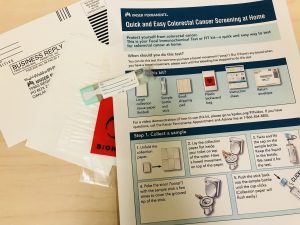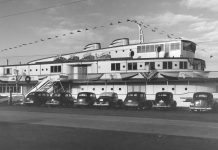Submitted by Yan Liu Baum, MD, Kaiser Permanente Tacoma South Clinic
Mr. and Mrs. Liu emigrated from Asia in the 1980s and have 4 adult children and 10 grandchildren. The couple always comes to clinic together, sometimes with their beautiful granddaughter.
When they reached the age of 50, I told them we needed to screen for colon cancer. Both of them declined since they do not have any colon cancer history in their family. Mrs. Liu always told me that she felt very good with a good appetite, no abdominal pain, regular bowel movements, never any dark stool, no nausea, and no vomiting. So, she did not want to do the colon cancer screening.

Eventually, after several years, she agreed to a stool test kit for use at home, which is then mailed in to a lab for analysis. The FIT (fecal immunochemical test) looks for hidden blood in the stool that can be an early sign of cancer. Mrs. Liu’s test showed she did have blood in the stool. I told her then she needed to have a colonoscopy done, yet Mrs. Liu declined the colonoscopy again. When I encouraged her to get the colonoscopy, she again rejected the request several times.
Then one day, she came here with very bad abdominal pain with diarrhea. I got her to have an abdominal CT which showed she had possible metastasis tumor in the abdomen. (A metastasis tumor means it has spread from an initial site to other places in the body.) Sadly, Mrs. Liu passed away three months later.
Mr. Liu felt very sad after his wife passed away. He came to the office a week after his wife’s death and said, “I would like to do the colon cancer screening.”
As a family physician, every day I answer the questions like those from Mr. and Mrs. Liu about colon cancer. Common topics include:
- Colon cancer is common, the second leading cause of cancer death in the U.S. However, if found early – while still confined to the colon – colon cancer can be cured.
- Colon cancer can be screened. Not every deadly cancer can be screened. Colon cancer is one of only a few cancers to be screened, among over hundred types of cancer.
- Colon cancer can be present even when a patient feels fine. Because there is no single symptom at the early stage of colon cancer, a patient simply would not know they have an early form of colon cancer. If you have symptoms, such as abdominal pain or obvious blood in the stool, it is possible it could be late in the process and the outcomes are usually much worse.
-

Dr. Yan Baum. Photo courtesy: Kaiser Permanente Patients with no family history can get colon cancer. It is true that a family history of colon cancer will increase the incidence of colon cancer. However, among all colon cancer patients, most of them do not have family history of colon cancer.
- If you have bleeding from hemorrhoids, a FIT kit isn’t sufficient screening. There is no way to tell if bleeding is only from hemorrhoids without further testing – meaning a colonoscopy. If the stool test is positive for blood, then the colonoscopy has to be done to rule out colon cancer.
- Screening for colon cancer can be easy and most people can do it with an at-home kit. People with average risk can be screened with either a home FIT kit (stool test called fecal immunochemical test) or colonoscopy. Both options are equally effective in detecting colon cancer. However, remember FIT tests have to be done every 12 months to be effective, not every 18 months or 24 months. A colonoscopy may need to be done once every 10 years (unless they find a reason to check more often, see below).
- If a colonoscopy discovers a polyp, it could increase the frequency which you need to do colonoscopies. There are different kinds of polyps. A polyp just means an abnormal growth sticking out of a membrane. Some of them are precancerous polyps; if these are found, and depending on the patient’s history, then more frequent colonoscopies may be required.
- We recommend patients start screening for colon cancer at age 50. The need to screen can depend on the individual’s history. Usually an average-risk patient will start at the age of 50. The high-risk patient or a patient with a family history of colon cancer should probably start younger.
- Effectiveness or quality of colon cancer screen varies. Like controlling blood pressure or controlling diabetes, colon cancer screening rates among physicians vary. Kaiser Permanente is currently a high performer for colon cancer screening, and we have a team at Kaiser Permanente Washington dedicated to further improving our colon cancer screening.
- Many cases of colon cancer are preventable through diet and lifestyle changes. There are multiple studies showing that higher vitamin D level (> 40 ng/ml) reduces risk of colon cancer. Poor diet (such as lack of plant foods), low physical activity, obesity (a risk factor for cancer in general), tobacco and alcohol use, as well as poor sleep are associated with increased risk of colon cancers. Poor blood sugar control and in particular diabetes raises the risk of colon cancer.
Mr. Liu is a leader in his own community. Since the death of his wife, he has been actively encouraging his own community to get colon cancer screening. He is happy in this way that he can help his community and, in some ways, both honor his wife’s memory and use his wife’s personal tragedy can be to help others avoid a similar fate.


































